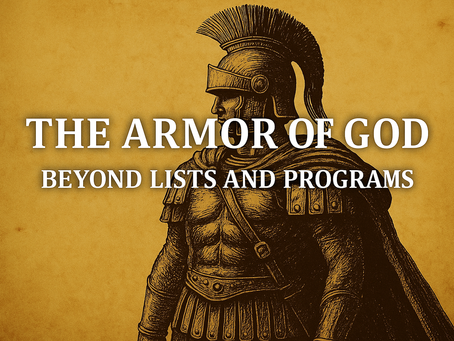top of page


Zerah: The Twin Marked by the Scarlet Thread
Zerah: The Twin Marked by the Scarlet Thread. Zerah, one of the twin sons of Judah and Tamar, is remembered for his unusual birth recorded in Genesis 38. While his brother Perez broke through first and carried the Messianic line, Zerah was marked by a scarlet thread tied around his wrist as he briefly emerged first.
3 min read


Levirate Marriage: Duty, Covenant, and Fulfillment
Levirate Marriage: Duty, Covenant, and Fulfillment. The practice of levirate marriage is one of the most curious and often misunderstood features of biblical law. At first glance, it may seem strange, even scandalous: a man marrying his brother’s widow to raise up offspring in his brother’s name. Yet within its cultural and covenantal context, levirate marriage reveals God’s concern for justice, family preservation, and ultimately, the unfolding of His promises.
3 min read


A Bride for Isaac: Providence at the Well
A Bride for Isaac: Providence at the Well. Genesis 24 reads like a short story with a long shadow. Sarah has died; Abraham is old; the covenant promises still stand—but the line must continue. Into that tension God weaves one of Scripture’s most elegant providence narratives: a servant, a desert well, ten camels, a young woman named Rebekah, and a marriage that will carry the promise forward. This is no fairy tale.
5 min read


Shem, Ham, and Japheth: The Fathers of Nations
Shem, Ham, and Japheth: The Fathers of Nations. After the flood, humanity began again through Noah’s three sons: Shem, Ham, and Japheth. Their lives represent a new beginning for the world and the foundation of nations that would shape biblical history. These brothers stand as a turning point: the earth had been wiped clean by judgment, and from their families the entire world would be repopulated.
5 min read


The Noahide Laws: Biblical Origin and Christian Context
The Noahide Laws: Biblical Origin and Christian Context. The so-called “Noahide Laws” are often presented as a universal moral code given by God to Noah after the flood. In rabbinic tradition, these became the foundation for ethical behavior expected of all nations, in contrast to the 613 commandments given to Israel through Moses. In modern times, they are sometimes invoked in interfaith dialogue, Jewish teaching, and even political discourse.
3 min read


Adam: The First Man and the Fall of Humanity
Adam: The First Man and the Fall of Humanity. When we open the pages of the Bible, we are immediately introduced to the first human being: Adam. His life sets the tone for the human story, a mixture of beauty and tragedy, hope and failure. Adam is more than just the first man; he represents humanity’s capacity for relationship with God and our desperate need for redemption.
5 min read


Is “Jesus Wept” Really the Shortest Bible Verse?
Is “Jesus Wept” Really the Shortest Bible Verse? Almost every Sunday School class or trivia game has used it: “What’s the shortest verse in the Bible?” Answer: “Jesus wept” (John 11:35). It’s true in English—but the original Greek tells a more nuanced story. Let’s take a closer look.
2 min read


What Does the Bible Say About Depression?
What Does the Bible Say About Depression? Depression is not new. While modern medicine gives us diagnostic terms and categories, the crushing weight of sorrow, hopelessness, and despair is as old as humanity itself. The Bible does not shy away from this darkness. Instead, it gives us raw prayers, broken prophets, and even the suffering Savior Himself as examples of how God meets us in the pit.
3 min read


The ESV: History, Method, and Meaning
The ESV: History, Method, and Meaning. The English Standard Version (ESV), first published in 2001, has quickly become one of the most influential English translations of the Bible. Marketed as “essentially literal,” it aims for word-for-word accuracy while maintaining readability. Popular among Reformed and complementarian circles, the ESV has become the standard translation for many evangelical churches.
4 min read


The Two Witnesses of Revelation 11: The Church’s Prophetic Calling
The Two Witnesses of Revelation 11: The Church’s Prophetic Calling. Few images in Revelation have been as misunderstood as the two witnesses of Revelation 11. Some expect Elijah and Enoch to return in the flesh; others anticipate two mysterious prophets in the end times. But when Revelation is read in light of its own symbolism and the Old Testament background, the witnesses are revealed as the church itself in its prophetic mission.
3 min read


The Millennium of Revelation 20: Two Resurrections and the Final Consummation
The Millennium of Revelation 20: Two Resurrections and the Final Consummation. Revelation 20 presents the vision of the Millennium (χίλια ἔτη, chília étē), a thousand-year reign of Christ. Few passages in Scripture have provoked as much controversy.
6 min read


Book of 2 Peter Summary: Guarding the Truth and Growing in Grace
Book of 2 Peter Summary: Guarding the Truth and Growing in Grace. The Second Epistle of Peter is a sober and urgent letter. It warns against false teachers, reminds believers of the certainty of Christ’s return, and calls them to steadfast growth in holiness. Written as Peter’s farewell message, it carries the weight of a spiritual testament—urging the church to guard the truth, persevere in godliness, and cling to the promises of God.
4 min read


Who Wrote Hebrews? A Scholarly Examination of an Ancient Question
Who Wrote Hebrews? A Scholarly Examination of an Ancient Question. The Epistle to the Hebrews is one of the most sophisticated writings in the New Testament. It combines an unparalleled mastery of the Greek Old Testament (Septuagint) with exalted Christology and pastoral exhortation. Yet, unlike Paul’s letters, it bears no opening salutation or claim of authorship. From the second century until now, scholars and church leaders have wrestled with the question: who wrote Hebrew
5 min read


Book of Hebrews Summary: Christ the Better Covenant
Book of Hebrews Summary: Christ the Better Covenant. The Letter to the Hebrews is one of the most theologically rich writings in the New Testament, presenting Christ as the fulfillment and surpassing reality of the Old Testament covenant. Written to Jewish Christians who were tempted to drift back into the old system of sacrifices, priests, and temple rituals, Hebrews argues that Jesus is better than angels, Moses, the priesthood, and the sacrificial system itself. It is both
5 min read


Book of 2 Timothy Summary: Faithful to the End
Book of 2 Timothy Summary: Faithful to the End. 2 Timothy is Paul’s final letter, written from prison in Rome with the shadow of death looming over him. It carries the tone of a farewell testament, combining personal affection with urgent exhortation. Paul writes to his “beloved son” in the faith, Timothy, urging him to remain steadfast in the gospel amid hardship, false teaching, and persecution.
5 min read


Book of 2 Thessalonians Summary: Perseverance and Misunderstood Prophecy
Book of 2 Thessalonians Summary: Perseverance and Misunderstood Prophecy. 2 Thessalonians is a follow-up to Paul’s first letter to the Thessalonian church, written only a short time later. Whereas 1 Thessalonians emphasized encouragement and hope in the face of persecution, 2 Thessalonians addresses confusion about the timing of Christ’s return.
5 min read


The Regional Letters: Paul’s Network in Asia Minor
The Regional Letters: Paul’s Network in Asia Minor. When we think of Paul’s letters, we often divide them into categories like “Prison Epistles” or “Pastoral Epistles.” These categories are helpful, but they do not fully capture the web of connections that link certain letters together by geography, personnel, and theme. A closer look at Ephesians, Colossians, Philemon, and 1 & 2 Timothy reveals that they function as regional letters.
4 min read


Anxiety and the Christian Life: Wrestling with Paul, Jesus, and Reality
Anxiety and the Christian Life: Wrestling with Paul, Jesus, and Reality. One of the most quoted verses in Philippians is Paul’s admonition: “Do not be anxious about anything” (Phil. 4:6). Many Christians take this as a command, and when they inevitably feel anxious, they experience guilt on top of their worry. But what did Paul actually mean? And how does this line harmonize with the rest of Scripture — especially considering that both Paul and Jesus themselves experienced de
3 min read


The Armor of God: Beyond Lists and Programs
The Armor of God: Beyond Lists and Programs. Few passages in Paul’s letters capture the imagination like Ephesians 6:10–18, where he calls believers to “put on the full armor of God.” For centuries, Christians have drawn strength from the imagery of helmets, shields, and swords. Yet too often, this has been reduced to a rigid checklist or a “spiritual warfare program,” as if Paul intended a formula for battle.
4 min read


The Fruit of the Spirit vs. the Sin of the Flesh: Evidence of Salvation
The Fruit of the Spirit vs. the Sin of the Flesh: Evidence of Salvation. The Christian life is not defined merely by what we claim with our lips but by what is produced in our lives. Jesus said, “You can identify them by their fruit, that is, by the way they act… A good tree can’t produce bad fruit, and a bad tree can’t produce good fruit.” (Matt. 7:16, 18, NLT). Paul echoes this in Galatians 5, contrasting the works of the flesh with the fruit of the Spirit.
3 min read
bottom of page